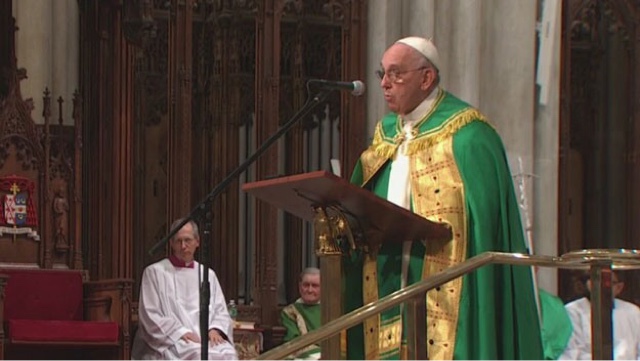The Servant of God succeeded in His Mission

I wrote a text in 2015 criticizing the words of Pope Francis when he was visiting the United States. He said that because Jesus had failed on the cross, we can fail too in our daily actions. But that is not what the Bible says about Jesus’ death on the cross and I responded to Pope Francis by saying he was wrong.
Our failures and sins can be forgiven because Jesus did not fail on the cross.
Some criticized my text saying that maybe I had misunderstood him, and even some religious leaders agreed with the Pope, in an attempt to soften the pontiff’s words. The text is on the web “The Failure or the Victory of the Cross” and it is in Portuguese ” (O Fracasso da Cruz ou a Vitória da Cruz) 1
According to the Pope, Jesus, in his human nature, failed on the cross, because he died on the cross, so His death was a failure and thus we can fail too. In addition to the lack of biblical basis for such a position, as I have shown in my first text, I will show here what God said in relation to his “Servant” Jesus and His death on the cross.
In the first text “The Failure or the Victory of the Cross”, I used the New Testament to show that Jesus did not fail on the cross, in this text I will show through the Old Testament that Jesus succeeded in his mission and did not fail as Pope Francis implied.
When we do an exegesis of the text in Isaiah 52:13 – 53:12, which speaks of the suffering and glory of the Servant of the Lord, we find that God is saying that his Servant would be successful in his mission.
The Servant of the Lord introduced in Isaiah 52:13 – 53:12 describes the suffering of the Messiah. This text speaks of how He was disfigured, had no beauty, was despised, took our iniquities upon Himself, and was oppressed, and humiliated, among other things.
When we read Isaiah 52:13 “Behold, my servant deal prudently; He shall be exalted and extolled and be very high” (NKJV) we have the perfect figure of the Messiah who is Jesus.
In the original Hebrew, the words “prudence” or “wisdom” is sakal which also means “to succeed, or to be successful”; then the text says He “shall be exalted” which in Hebrew is rum which means “to be lifted up, indicating beginning”; then text still says; “extolled” which is nasa in Hebrew indicating to ascend, in a continuation sense, and finally “very high” which is gabah, which indicates “highly exalted”. In Hebrew there is an “e” before the “highly exalted”, which is called “waw consecutive”, indicating sequence.
In the NIV translation, we have: “Behold, my servant will act wisely, He shall be raised and lifted up and highly exalted”.
So what we have here is God saying that his Servant will act with prudence or wisdom and be successful (sakal). And the result or proof of this is that He will be raised (rum), referring to His resurrection; He will then be lifted up (nasa), which refers to his ascension, and He will be highly exalted (gabah) which refers to his final state, at the climax of the sequence of events.
In verse 14 we find the word “shaman” which means to be “speechless or speechless” due to the terrible scene, for He did not seem human. In verse 15 we find the word “naza” or “sprinkle” which is the same word used in the Old Testament when the sacrifice was made and the blood was sprinkled for the remission of sins. Then the Servant should die, resurrect, suffer and sprinkle his blood for the nations, bringing salvation to the whole world, and finally, the Kings of the world will close their mouths and worship him because they will understand what the Servant accomplished. 2 In Jesus, we have the fulfillment of that prophecy.
In conclusion, we have God (Yahweh) saying that his Servant WOULD be successful and that he WAS successful in his mission. The Servant fulfilled the work God gave him, dying on the cross for our sins (Isaiah 53:10-12), the Servant will triumph (v10), because of his prudent act many will be justified (v11), and because he bore our sins He will be exalted. (v12).
We find in this text in Isaiah (52:13 – 53:12), not only the prophecy but the fulfillment of the prophecy written approximately 700 years earlier.
So with all certainty, we can say that Jesus did not fail on the cross, for God himself said that His Servant Jesus would not fail on the Cross.
And you will know the truth, and it will set you free. (John 8:32)
Joel Marcos Stevao
Christian Apologist

4 replies on “The Victory of the Cross”
Bravo brother! What an amazing explanation to those who can’t grasp the truth about Jesus’ victory on the cross! Hallelujah! I wished the pope himself would read it, hopefully understand it and, most importantly, repent for saying such abomination and heresy! Unfortunately, the pope still can’t understand that, because Jesus’ victory on the cross, we are saved and we have been set free! G’d never fails!!! It’s finished! #tetelestai
Thank you sister. Perfect.
Excelente artigo meu irmão!
Se realmente Jesus tivesse fracassado na cruz o cristianismo não existiria, pois o plano de redenção, através da cruz, não seria considerado uma ação completa Como diz Tiago 1:3-4 “sabendo que a provação da vossa fé, uma vez confirmada, produz perseverança. 4 Ora, a perseverança deve ter ação completa, para que sejais perfeitos e íntegros, em nada deficientes” nem muito menos seria escrito Fil 2:5-11 “Seja a atitude de vocês a mesma de Cristo Jesus, que, embora sendo Deus, não considerou que o ser igual a Deus era algo a que devia apegar-se; mas esvaziou-se a si mesmo, vindo a ser servo, tornando-se semelhante aos homens. E, sendo encontrado em forma humana, humilhou-se a si mesmo e foi obediente até a morte, e morte de cruz! Por isso Deus o exaltou à mais alta posição e lhe deu o nome que está acima de todo nome, para que ao nome de Jesus se dobre todo joelho, nos céus, na terra e debaixo da terra, e toda língua confesse que Jesus Cristo é o Senhor, para a glória de Deus Pai”, assim como as cartas de Paulo, Timoteo, Tiago…
Ou seja a afirmação do pontífice foi totalmente anti-Bíblica.
Perfeito brother. Obrigado.